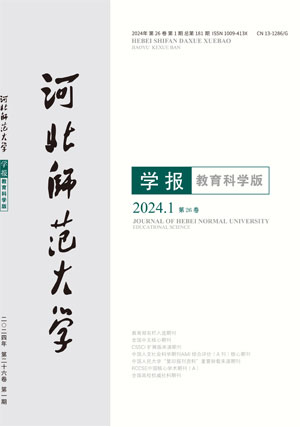期刊信息

- 刊名: 河北师范大学学报(教育科学版)Journal of Hebei Normal University (Educational Science Edition)
- 主办: 河北师范大学
- ISSN: 1009-413X
- CN: 13-1286/G
- 教育部名栏入选期刊
- 全国中文核心期刊
- CSSCI扩展版来源期刊
- AMI综合评价(A刊)核心期刊
- RCCSE中国核心学术期刊
- 全国高校特色栏目社科学报
- 中国人民大学“复印报刊资料”重要转载来源期刊
- 全国高校权威社科期刊
院校市场背景下高校品牌的形成机制—基于组织内外部互动的理论分析
-
作者单位:(中央财经大学 发展规划处,北京 100081) -
起止页码:72 - 80页 -
DOI:10.13763/j.cnki.jhebnu.ese.2023.06.010
University Branding Mechanism in the Context of Institutional Market: A Theoretical Analysis Based on Internal and External Interactions of Organizations
摘要/Abstract
院校市场是高校围绕声誉、地位和资源形成的竞争场域,是高等教育市场的重要子类型,作为竞争主体的高校需加强品牌建设以传递质量与特色信号,获取竞争优势。高校品牌的构建应统筹考虑内部品牌、外部品牌的形成机制及其逻辑关系。从内部品牌来看,有效的内部市场导向、教职工的组织认同与教职工的品牌支持行为三者之间的正相关关系是高校内部品牌形成的关键。从外部品牌来看,高校应积极与高等教育系统和社会系统内的其他组织进行互动,以充分挖掘和利用嵌入在社会关系网络中的社会资本,通过增强身份认同和社会价值打造品牌优势。无论是内部品牌还是外部品牌的构建过程,都应重视信号传递与反馈机制的重要性,保证内外部关系的良性互动。总体来看,高校内部品牌和外部品牌本质上是高校品牌的“一体两面”,高校品牌的形成过程就是高校组织与内外部关键利益相关者进行价值共创的过程,只是与内外部关键利益相关者之间的价值共创行为或方式有所差异。
As an important sub-type of higher education market, institutional market is an arena developed by universities to vie for reputation, status and resources. As the main competitor, universities need to strengthen their branding to send out signals about quality and characteristics and gain competitive advantage. To build university brands, we should consider the branding mechanism and logical relationship of internal brands and external brands as a whole. From the perspective of internal brand, the positive correlation among effective internal market orientation, faculty organizational identity and faculty brand support behavior is the key to the formation of internal brand in universities. From the perspective of external brands, universities should take the initiative to interact with other organizations in the higher education system and social system, so as to tap and make full use of social capital embedded in social networks and strength their brand by enhancing identity and social values. For both internal and external brands, importance should be attached to signal transmission and feedback mechanism to ensure the benign interaction between internal and external relations. Generally speaking, the internal and external brand of a university are essentially “two sides of the same thing.” A university’s branding process is a process of value co-creation between the university and its key internal and external stakeholders, but there are differences in the value co-creation behaviors or methods between the university and its internal and external stakeholders.
关键词
参考文献 39
- [ 1 ] 中共中央国务院关于分类推进事业单位改革的指导意见[EB/OL].(2011-03-23)[2021-05-17].http://www.gov.cn/gongbao/content/2012/content_2121699.htm.
- [ 2 ] 统筹推进世界一流大学和一流学科建设总体方案[EB/OL].(2015-11-05)[2021-05-17].http://www.moe.gov.cn/jyb_xxgk/moe_1777/moe_1778/201511/t20151105_217823.html.
- [ 3 ] 国家中长期教育改革和发展规划纲要(2010-2020年)[EB/OL].(2010-07-29)[2021-05-17]. http://www.gov.cn/jrzg/2010-07/29/content_1667143.htm.
- [ 4 ] 周光礼.回归复杂性:未来大学展望[J].高等工程教育研究,2015(6):43-52.
- [ 5 ] 蒋凯.高等教育市场及其形成的基础[J].高等教育研究,2013(3):9-20.
- [ 6 ] Chapleo C. What Defines “Successful” University Brands?[J].International Journal of Public Sector Management, 2010,23(2):169-183.
- [ 7 ] Chapleo C. Brand “Infrastructure” in Nonprofit Organizations: Challenges to Successful Brand Building?[J].Journal of Marketing Communications, 2015,21(3):199-209.
- [ 8 ] Musa Pinar, Paul Trapp, Tulay Girard, Thomas E. Boyt. University Brand Equity: An Empirical Investigation of its Dimensions[J].International Journal of Educational Management, 2014,28(6):616-634.
- [ 9 ] 刘贵富.大学品牌创建与发展战略研究[J].中国高等教育,2006(7):57-58.
- [ 10 ] 时明德.大学品牌建设的基本策略探析[J].中国高等教育,2011(24):43-45.
- [ 11 ] 王恒.我国大学品牌战略构建:从内涵解析到要素组合——基于市场营销学的分析[J].江苏高教,2010(6):11-14.
- [ 12 ] Whisman R. Internal Branding: a University’s Most Valuable Intangible Asset[J].Journal of Product & Brand Management,2009,18(5):367-370.
- [ 13 ] Liu G, Chapleo C, Ko W W, et al. The Role of Internal Branding in Nonprofit Brand Management: An Empirical Investigation[J].Nonprofit and Voluntary Sector Quarterly,2015,44(2):319-339.
- [ 14 ] Chapleo C. Brands in Higher Education: Challenges and Potential Strategies[J].International Studies of Management and Organization,2015,45(2):150-163.
- [ 15 ] Bootsriphum B, Ditsakul S, Musikaphan W, et al. University-Accreditation Brand Alliance: The Effects of the Alliance Message on the University’s Brand Evaluations[J].Utcc International Journal of Business & Economics,2015:177-194.
- [ 16 ] 王彦斌.中国组织认同[M].北京:社会科学文献出版社,2012.
- [ 17 ] 王彦斌.管理中的组织认同——理论建构及对转型期中国国有企业的实证分析[M].北京:人民出版社,2004.
- [ 18 ] Burmann C, Zeplin S, Riley N. Key Determinants of Internal Brand Management Success: An Exploratory Empirical Analysis[J].Journal of Brand Management,2009,16(4):264-284.
- [ 19 ] Burmann C, Zeplin S. Building Brand Commitment: A Behavioural Approach to Internal Brand Management[J].Journal of Brand Management,2005,12(4):279-300.
- [ 20 ] 潘杨.高校教师职业认同、组织认同与创新行为研究[D].成都:西南财经大学,2014.
- [ 21 ] Yu Q, Asaad Y, Yen D A, et al. IMO and Internal Branding Outcomes: An Employee Perspective in UK HE[J].Studies in Higher Education,2018,43(1):37-56.
- [ 22 ] 黎光明,周国华.一项结构方程模型分析:高校教师组织认同感与组织公民行为的关系[J].心理研究,2012(5):51-57.
- [ 23 ] Stensaker B. Organizational Identity as a Concept for Understanding University Dynamics[J].Higher Education,2015,69(1):103-115.
- [ 24 ] 眭依凡,蔡连玉,王占军,刘爱生.大学内部治理研究:文献回顾与研究展望[J].河北师范大学学报(教育科学版),2021(5):1-10.
- [ 25 ] 包亚明.布尔迪厄访谈录——文化资本和社会炼金术[M].上海:上海人民出版社,1997.
- [ 26 ] 王雨磊.论社会资本的社会性——布迪厄社会资本理论的再澄清与再阐释[J].南京师大学报(社会科学版),2015(1):21-28.
- [ 27 ] [美]詹姆斯·科尔曼著.社会理论的基础[M].邓方,译.北京:社会科学文献出版社,1999.
- [ 28 ] [美]林南著.社会资本——关于社会结构与行动的理论[M].张磊,译.上海:上海人民出版社,2005.
- [ 29 ] 侯志军.社会资本与大学发展研究[D].武汉:华中科技大学,2008.
- [ 30 ] 石军伟,胡立君等.企业社会责任、社会资本与组织竞争优势:一个战略互动视角——基于中国转型期经验的实证研究[J].中国工业经济,2009(11):87-98.
- [ 31 ] 朱慧,周根贵.社会资本促进了组织创新吗?——一项基于Meta分析的研究[J].科学学研究,2013(11):1717-1725.
- [ 32 ] 周光礼.从同型竞争到错位竞争——高校品牌形成机制研究[J].中国高教研究,2017(10):4-12.
- [ 33 ] [美]迈克尔·斯彭斯著.市场信号传递:雇佣过程中的信息传递及相关筛选过程[M].李建荣,译.北京:中国人民大学出版社,2019:4-22.
- [ 34 ] 刘林.基于信号理论视角下的企业家政治联系与企业市场绩效的关系研究[J].管理评论,2016(3):93-105.
- [ 35 ] [美]约瑟夫·斯蒂格利茨著.信息经济学:基本原理[M].纪沫,陈工文等,译.北京:中国金融出版社,2009.
- [ 36 ] 武文珍,陈启杰.价值共创理论形成路径探析与未来研究展望[J].外国经济与管理,2012(6):66-73.
- [ 37 ] Kumar Rakesh Ranjan, Stuart Read. Value Co-creation: Concept and Measurement[J].Journal of the Academy of Marketing Science,2016,44(3):290-315.
- [ 38 ] 杨保军.企业品牌价值共创关键维度与路径案例研究[J].北方民族大学学报(哲学社会科学版),2019(2):73-81.
- [ 39 ] Foroudi P, Yu Q, Gupta S, et al. Enhancing University Brand Image and Reputation Through Customer Value Co-creation Behaviour[J].Technological Forecasting and Social Change,2019,138(1):218-227.
